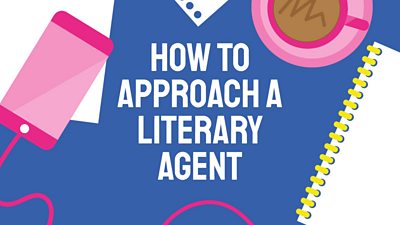Recently, we noticed a from on how to approach a literary agent. This is a question writers ask regularly so we asked her to expand on her tweets.

Approaching a literary agent for representation can be daunting. The questions circling in your mind as you begin to type are probably along the lines of ‘how do I stand out?’, ‘how do I sell myself’, ‘who do I write to?’…‘what do I say?’.
Agents receive dozens of representation enquiries each week, and the problem is that there are far more brilliant creatives out there than there are agents available to represent them. This means some emails might go unanswered and you’ll receive a few ‘sorry, my list is full’ responses. It’s tough but it’s part of the process; try not to let those rejections deter you or knock your confidence. Talent always finds its way, and it can take time; I for one am guilty of now representing a couple of writers who I had sent that ‘sorry, my list is full’ email to in the past…
����…h�Ƿ� do you make that first approach?
In my experience, email is always best. It gives you the chance to reflect and think about what you want to say, and it also gives the agent time to reflect and think about their response. I’d discourage a scattergun approach of contacting agents on their social media platforms unless they say they welcome submissions this way.
Do your research...
When you’re choosing who to write to, be selective. Don’t send one email and blind copy every agent in town. Choose one agent to write to at each agency. If you write to multiple agents at one company, it can feel untargeted and unfocused. Pick the agent who you think will connect most with your voice – a good starting point is to look up agents who represent talent you admire. Once you have your list of who you’d like to approach try and find their contact details online and send them an email directly (cc’ing their assistant if they have one).
It might also be worth looking at who the junior agents are at each company if you’re a brand new writer, as a junior agent will be looking to nurture new talent as they also begin to build their own career. Don’t worry about not reaching the whole company; in most cases it’s company practice for agents to share representation requests internally if their list is too full but they see potential in an email. is a great resource to begin your agent search – it’s a professional body for talent agencies in the UK and there are 200 agencies and management companies signed up to it. You can see its full list of members on the website. Remember talent agencies represent different types of creatives so make sure you’re not approaching an acting agent about literary representation etc.
Think about your email...
Treat it as though you’re writing a cover letter. No one email to each agent should read the same. Tell the agent about yourself, your work, why the time feels right for you to be securing representation and mention any accolades or important connections you’ve made. Don’t be afraid to boast about your achievements – we want you to namedrop the hell out of everything so your email stands out from the crowd. Let us know of any producers you’ve met with who gelled with your work, any competitions or awards you’ve won or been shortlisted for and any festivals your work has screened at. A simple hack can be to write some of these buzzwords in bold so they’re easy to spot e.g. I was recently selected for the ����ý Writersroom's Drama Room group.
Occasionally producers will email agents recommending potential clients. If a producer or commissioner has recommended you to a specific agent, you can ask them if they wouldn’t mind emailing the agent first on your behalf. Or if you don’t feel comfortable asking them, you should write at the beginning your own email that said person recommended you reach out. Agents receive so many requests, so an email with a recommendation from someone whose taste they admire will likely pique their interest.
Think of an eye-catching subject line for your email. If I had a pound for each email I receive titled ‘seeking representation’ I could hang up my agenting boots for good! Use those buzzwords again to encourage the agent to open your email e.g. “����ý commissioned writer – seeking representation”.
Your Spec Script...
The most polarising question is always whether to attach a sample of your work. Do check each company’s submission policies first, but in my experience there’s no harm attaching a sample on the off-chance the agent might dip into it. If you do decide to send your work then attach one original and full sample. The piece you feel best defines you and your voice, be it a produced short film, a screenplay, TV pilot, play or web series.
We want to read something that feels authentic to you so when thinking about writing specs write what you want to write. Don’t think about something which has been successful and try to imitate it, and don’t limit yourself by writing to the constraints of a budget. The most exciting shows and films are always something which has never been seen or done before, and if you want to write that multi million dollar sci-fi pilot then do it. Ultimately, your spec script might not be the one that gets made first so it really doesn’t matter what it’s about or where it’s set. All we care about is the writing.
What then?
It's likely that you will need to chase whoever you have emailed (here is where I apologise on behalf of all agents…). If you don’t hear back in three to four weeks, send a follow-up email on the same chain (re-attaching the attachment if you’ve sent a sample). If you don’t hear back again then send another follow up a few weeks later, and so on. Don’t be afraid to check in and nag us. It might be that the agent has been busy firefighting a myriad of issues for their existing client base and that they’re keen to consider but haven’t had a chance to write back yet. If they have an assistant then you can send them an email too separately asking if the agent has had a chance to take a look.
When you secure an agent...
They will help you strategize, develop your ideas and plan your career. They will act as the intermediary between you and producers, selling your projects, suggesting you for any upcoming roles, negotiating your deals and mediating any unexpected issues which can arise during development and production.
When a client first signs with me, I’ll introduce their work to the producers who I think will connect most with their writing based on the type of work such production companies have made. Ideally the new client will have a couple of new original spec scripts that I can try and sell to get into development at a production company. Hopefully producers will be just as blown away by the writing as I was and even if they aren’t keen to develop the project, they might request a general meeting where you can meet and discuss your other ideas. By going out and meeting producers you will start to be at the forefront of their minds for any opportunities which may arise in the near future such as episodic work and writers rooms.
The road to getting an agent can be long but don’t give up hope. The advice in this article is very much based on the way I work and my own experiences. Ultimately do what feels right for you, and the writing of course will always speak for itself. Good luck!
More on the blog:
